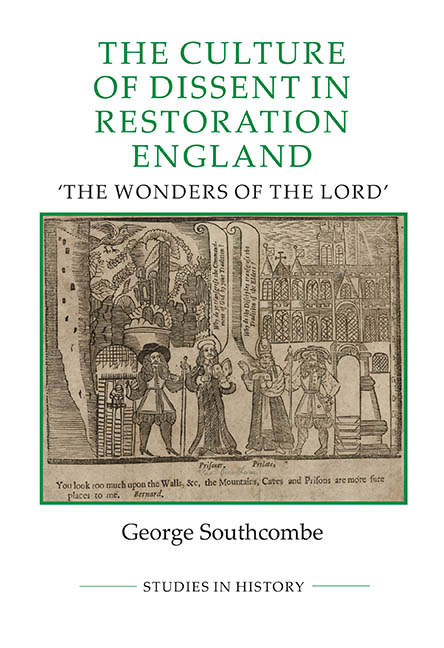Book contents
- Frontmatter
- Dedication
- Contents
- Acknowledgements
- Abbreviations
- Note on the text
- Introduction
- 1 Presbyterians, poetry and politics: Robert Wild: the ‘Scarlet Staine of Divinity’
- 2 Fluidity and fixity: the religious identity of Thomas Grantham
- 3 ‘Upheld by His Mighty Power’: John Whitehead and the Restoration Quakers
- 4 The paradoxes of dissent? Vavasor Powell and Benjamin Keach
- Conclusion
- Bibliography
- Index
1 - Presbyterians, poetry and politics: Robert Wild: the ‘Scarlet Staine of Divinity’
Published online by Cambridge University Press: 19 March 2020
- Frontmatter
- Dedication
- Contents
- Acknowledgements
- Abbreviations
- Note on the text
- Introduction
- 1 Presbyterians, poetry and politics: Robert Wild: the ‘Scarlet Staine of Divinity’
- 2 Fluidity and fixity: the religious identity of Thomas Grantham
- 3 ‘Upheld by His Mighty Power’: John Whitehead and the Restoration Quakers
- 4 The paradoxes of dissent? Vavasor Powell and Benjamin Keach
- Conclusion
- Bibliography
- Index
Summary
Robert Wild and the Restoration
Milton had warned them. In 1660, as England's republican experiment was in its death throes, he addressed ‘the new royaliz'd presbyterians’:
Let them but now read the diabolical forerunning libells, the faces, the gestures that now appeer foremost and briskest in all public places; as the harbingers of those that are in expectation to raign over us; let them but hear the insolencies, the menaces, the insultings of our newly animated common enemies crept lately out of thir holes, thir hell, I might say, by the language of thir infernal pamphlets, the spue of every drunkard, every ribald; nameless, yet not for want of licence, but for very shame of thir own vile persons, not daring to name themselves, while they traduce others by name; and give us to foresee that they intend to second thir wicked words, if ever they have power, with more wicked deeds.
Come 1662, the man who consistently saw himself as a prophet must have felt some grim satisfaction at having foretold events with such precision. In 1660 there was no group whose expectations were higher, and whose subsequent disappointment would be greater, than the Presbyterians. Having quickly denounced the regicide, leading Presbyterians were instrumental in bringing about the return of the king. Presbyterian politicians – the so-called Presbyterian knot – wanted the Restoration to take place under terms that had been put to Charles i in the Treaty of Newport of 1648. In religious terms, there was a profound sense that the clock could be turned back to 1558–9 and that a new religious settlement could correct the lilylivered Elizabethan compromise, and retrospectively fulfil the hopes of those who had always thought that the Church was ‘but halfly reformed’. Both political and religious schemes failed. This failure has generally been explained through an analysis of high politics and the official developments that marked its unfolding – the Worcester House Declaration, the Savoy House conference and the intemperate consideration of religious affairs by many within the Cavalier Parliament that led to Black Bartholomew's Day. However, as Milton's tirade reveals, the Restoration settlement was also debated and shaped out-of-doors. Authors of printed works sought to interpret recent events, to excavate (or rather construct) their underlying logic, in order to prescribe the future form of the Church and State.
- Type
- Chapter
- Information
- The Culture of Dissent in Restoration England"The Wonders of the Lord", pp. 25 - 76Publisher: Boydell & BrewerPrint publication year: 2019

